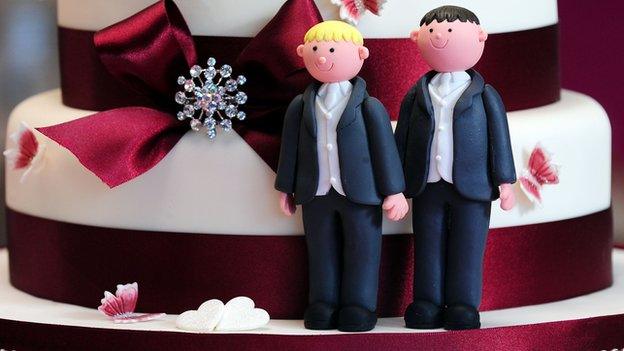Same-sex marriage: Should NI voters get to decide in a referendum?
- Published
- comments

MLAs have rejected the proposal to introduce gay marriage in four votes at the Northern Ireland Assembly, but should members of the public have their say on the issue?
So, if voters in the Republic of Ireland are going to the polls to give their views on same-sex marriage on 22 May, why shouldn't their counterparts north of the border get the same opportunity?
That's what Sinn Féin's Martin McGuinness wants, and both the SDLP and Alliance are prepared to give the idea a fair wind.
But unionists - who have until now blocked the introduction of same-sex marriage in a series of Northern Ireland Assembly votes - are not impressed. Both the DUP's Nigel Dodds and the UUP's Danny Kennedy indicated they would reject the move in a UTV election debate.
Supporters of change point to surveys suggesting the majority of people in Northern Ireland approve of same-sex marriage, external as evidence that MLAs are out of touch with public opinion.
But the problem with the referendum suggestion is that it is far from clear how such a poll might be called. Referenda tend to be much less frequent in the UK than in the Republic of Ireland. Although the 1998 Northern Ireland Act enables a Northern Ireland secretary of state to call a border poll in certain circumstances, nothing in it confers upon the assembly or the Northern Ireland Executive the right to hold a referendum of their own.
'Not binding'
If the assembly passed a motion calling on the Westminster government to hold a referendum, that might lead to London ministers passing the relevant legislation. Alternatively, Westminster could give Stormont the necessary authority to legislate for a referendum itself - which would be similar to what happened in Scotland in relation to last year's independence vote.
But both those scenarios would depend on there being a consensus at Stormont - something that does not exist, if the assembly's four same-sex marriage votes are anything to go by. Indeed in the wake of Mr McGuinness's latest call, the Ulster Unionist leader Mike Nesbitt has wondered - perhaps tongue in cheek - whether similar referenda should be held on issues like abortion, euthanasia and the death penalty. It is impossible to imagine London ministers pressing ahead in the knowledge that a majority of unionists are vehemently opposed to holding a poll.
Not all supporters of same-sex marriage think a referendum is a good idea. The lesbian, gay, bisexual and transgender (LGTB) support organisation, the Rainbow Project, argues that even if the public voted in favour of same-sex marriage the assembly might not regard it as binding. The Rainbow Project is backing a court case brought by a gay couple married elsewhere in the UK who are seeking a declaration that they remain legally married in Northern Ireland. The case is due to be heard again in November 2015.
So the courts may have their say on the current patchwork of marriage laws before any referendum becomes a reality. But if the convoluted history of cases like the ban on blood donations from gay men is anything to go by, then don't expect a clear answer from m'learned friends any time soon.